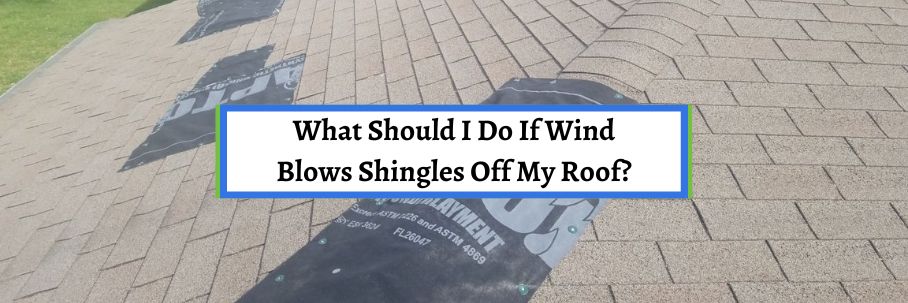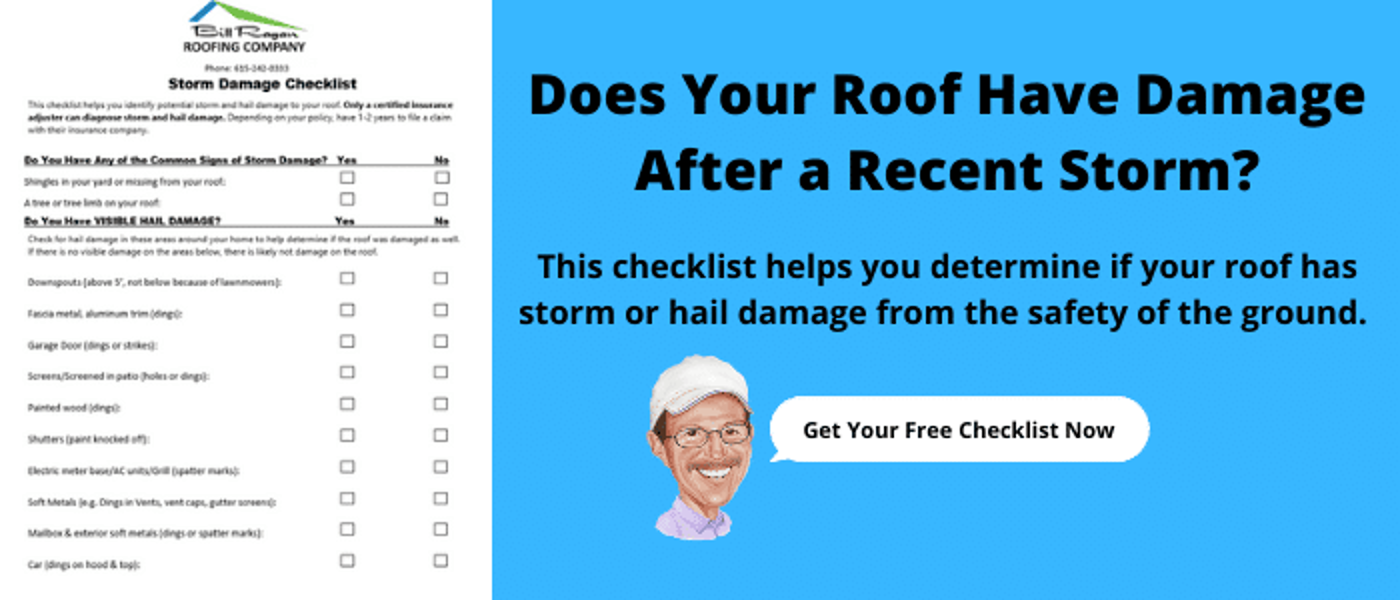What Should I Do If Wind Blows Shingles Off My Roof?

Your roof stands up to weather throughout its life, and your shingles are the first line of protection. But all it takes is one strong storm with straight-line winds to ruin the party.
These straight-line winds can lift and even rip shingles off roofs. This leads to finding shingles in your yard or missing from your roof with no trace at all.
I understand this is the last thing you want to see after a strong storm. However, you need to know what to do next because time is of the essence.
For over 30 years, the team at Bill Ragan Roofing has taken pride in providing transparent information to homeowners going through stress caused by roof damage. That’s why I want to walk you through what you should do as soon as you notice wind damage to your roof.
By the end, you’ll know exactly what to do when wind blows shingles off your roof.
Go through your homeowners insurance policy
The first thing you should do after noticing missing shingles is review your homeowners insurance policy to learn if wind damage is covered. Most homeowners insurance policies cover wind damage, but you just want to make sure it's not excluded.
After determining if it’s covered, you need to look at your specific type of policy to learn the payout you’ll get after filing a claim. Your insurance policy will be either for Actual Cash Value (ACV) or Replacement Cost Value (RCV).
Both policies cover wind damage to a roof, but the payouts are very different.
What is an Actual Cash Value insurance policy?
An Actual Cash Value policy means the insurance company only has to pay for the depreciated value of your roof. With this policy, you’ll only get a check for your roof's current value at the time of claim.
If your claim is approved, you’ll get a check for your roof’s actual cash value and then only have to pay the cost difference for your new roof out of pocket. Just know that the amount your roof depreciated and the check you’ll receive is determined by your insurance company.
What is a Replacement Cost Value insurance policy?
A Replacement Cost Value policy means the insurance company provides a payout for a full roof replacement. They’ll first send a check for the actual cost value of your roof and hold back the recoverable depreciation.
After your roof replacement, you’ll provide proof everything was done per the insurance claim. If everything checks out, the insurance company sends a second check that should cover most or the rest of the cost.
But if you don’t replace your roof or the claim wasn’t followed, they won’t send you the second check that covers the depreciated part of the claim. Just know that supplementing may be required to get your entire roof replacement paid for by insurance.
Your roofing contractor can help, but it takes due diligence on your part and can take time, depending on the amount of push back from the insurance company. If you don’t want to put in the work, an RCV policy will still cover a big piece of your roof replacement.
Contact your insurance company to file a claim for wind damage to your roof
After going through your policy and determining you want to file an insurance claim, you should contact your insurance company. After passing on all the relevant information, they’ll either send an adjuster or ask you to find a roofing contractor for an inspection
While the processes overlap and get to the same destination, they are a little different.
The insurance company sends out an adjuster
If they send out an adjuster, they’ll simply schedule a time to inspect the damage to determine if you have a claim. After that, they’ll either deny the claim or tell you to find a roofing contractor for an estimate.
Just know that if you already have a roofing contractor you trust, it’s not a bad idea to have them at the adjuster meeting. This ensures everyone is on the same page and you have backup from someone with experience.
The insurance company tells you to find a roofing contractor
If they tell you to find a roofing contractor, you’ll need to find one you trust who has experience working with insurance claims. After finding one, the roofing contractor will inspect your roof, look for signs of wind damage, take pictures to document the proof, and send it to your insurance company.
If the pictures show proof of wind damage, the insurance company will send out an adjuster to do a final inspection before approving the claim. Just know that your roofing contractor can’t approve your claim.
Even if your roofing contractor says you have wind damage, the adjuster and insurance company control whether it’s approved or not. But as long as there’s proof of wind damage, you shouldn’t have much trouble getting it approved.
Find a roofing contractor with insurance experience
While I just mentioned this, it’s important enough to warrant its own section. It’s absolutely crucial to find a roofing contractor with insurance experience.
This ensures they know the insurance claim process, how to read a claim, help you supplement, and how to do the work in compliance with your insurance company. You should also only look at roofing contractors local to your area.
Storm chasers will undoubtedly be in the area after damaging winds blow shingles off roofs. These out-of-state companies undercut local roofing company prices, take the money, do shoddy work, and move on to the next area.
They don’t care about making sure your roof is up to local codes or properly installing it. Once you watch them leave your driveway, I guarantee they won't be back if a problem comes up.
I'm not saying every storm chaser is like this, and there are some good companies out there. However, this happens way too often in the roofing industry, and there’s no reason to risk it.
What else do you need to know about getting a new roof through insurance?
Now you know what to do when wind blows shingles off your roof. But this is just the start of the journey of your insurance roof replacement.
So, I’m sure you have a lot more questions. Like, what do you pay when getting an insurance roof replacement? What should you do if your claim is denied? Do you need to get multiple quotes?
These are just three common questions homeowners ask when getting a new roof through the insurance company. That’s why I wrote another article answering the most common questions I’m asked about insurance roof replacements.
Check out The Top 9 Insurance Roof Replacement Questions Answered to continue learning about dealing with wind damage to your roof.


